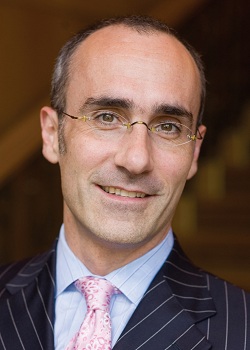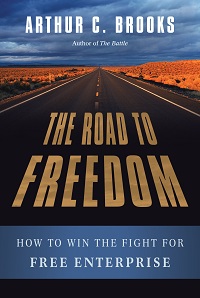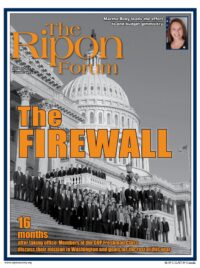
Arthur C. Brooks has been president of the American Enterprise Institute since January 1, 2009. Previously, he was the Louis A. Bantle Professor of Business and Government Policy at Syracuse University.
Throughout his career, Brooks has conducted research on the connections between culture, politics and economic life, and has published hundreds of articles and 10 books on subjects ranging from the economics of the arts to military operations research.
His most recent book is called The Road to Freedom, a blueprint for defending free enterprise against the powerful forces of big government. The Forum spoke with Brooks recently about The Road to Freedom, why he wrote it, and why it’s theme about the importance of free enterprise is especially relevant and important this election year.
∗∗∗∗∗∗∗∗∗∗∗∗∗∗∗∗∗∗∗∗
1. What was the genesis of this book?
I wrote The Road to Freedom to address what I see as a fundamental failure by the free enterprise movement to make the moral case for the system we love. For too long, we’ve defended free enterprise strictly in materialistic terms, focusing on how economic freedom makes people materially better off.
But that’s not what motivates me to fight for free enterprise, and this is true for most other advocates I know. We love free enterprise because it’s fair, because it gives us the space to lead meaningful lives, and because it provides real opportunities to the disadvantaged.
We love free enterprise because it’s fair, because it gives us the space to lead meaningful lives, and because it provides real opportunities to the disadvantaged.
In other words, I wanted to write what was in my heart, and what I believe is in the hearts of others who are passionate about free enterprise.
2. The book’s timing dovetails nicely with the Presidential campaign and the basic choice Americans will face this year between a candidate who stands for more freedom and a candidate who believes in more government. From a substantive perspective, if you were offering Mitt Romney advice this election, what specific issues and positions would you recommend he stand behind?
First and foremost, we have to get out of the way of entrepreneurs, the real American heroes for jobs and opportunity. That means we stop picking winners through bailouts and stimulus, we reject cronyism, and allow businesses to create jobs via tax and regulatory reform.
Second, we need policies that will stimulate economic growth, or we can kiss the opportunity society goodbye, which is about as immoral as you can get. That means decreasing the size of government and letting people keep more of what they earn, as well as adopting policies to ensure abundant energy.
Third, we have to rein in our deficits and debt, or we will be guilty of robbing our children. There’s nothing fair about that. This one is politically hard, but it’s relatively simple to understand. To fix deficits without hurting growth, we have to cut spending. To cut spending meaningfully, we need to fix entitlement spending. To fix the real entitlement problem, we have to reform Medicare. And to fix Medicare, we have to move to a market-based, defined contribution system.
3. What about themes? Your basic argument about “the moral case for free enterprise” implies that this case is bigger than any one issue or bill. How do you tie this case — this cause — into a larger narrative that Americans can identify with and relate to?

Morality defines public policy precisely because it’s the defining characteristic of our country. We’re a country of people who are largely descended from immigrants who came here not looking for a fairer system of forced wealth redistribution but a chance to make it on their own terms.
As I argued in my last book, The Battle, about 70% of Americans support free enterprise. To get them to embrace it, and even to sacrifice for it, we have to do a better job explaining how it is moral, and we have to conscientiously apply that framework and analysis to every policy issue. Our understanding of policy issues flows from our understanding of morality, not vice versa. So we have to make the moral case before we can get into the weeds of policy.
4. But what about the out-of-work Dad who was able feed his kids only because he was collecting an unemployment check? Or the single Mom who gets her health care through Medicaid? For every moral case for freedom that conservatives make, liberals come back with real-world examples of federal assistance that appeal more to the heart than the mind. Is it possible to counter these kinds of emotional appeals with logic and philosophy alone?
We tried that in welfare reform. For years, conservatives argued that federal welfare programs were a waste of taxpayer money. It wasn’t until Charles Murray explained to us in Losing Ground that the welfare state hurts the poor that we could make the moral case for this. Welfare hurts the poor, and hurting the poor is immoral! So we started making that case. And a decade later, President Clinton signed the Welfare Reform Act.
I believe in a social safety net to help only the poorest Americans, which is exactly what we don’t have. Our current “welfare” system gives lavishly to corporate cronies, people with bailouts and tax loopholes, and to middle class seniors who take more out of the system than they ever put into it. It’s intolerable.
…we have to remember who is really hurt when we run our free enterprise system over a cliff: the poor.
Furthermore, we have to remember who is really hurt when we run our free enterprise system over a cliff: the poor. When Social Security and Medicare go bankrupt and America faces a Greek-style debt crisis–which sooner or later it will if we don’t act–the ones left out in the cold won’t be me, President Obama, or most readers of the Ripon Forum. It will be the poor who lose their safety net. And it will be our fault.
5. Many of the solutions you discuss in your book – from reforming entitlement to revamping the tax code – have been debated and discussed for years in Washington. Are these kinds of solutions even possible given how gridlocked and some would say dysfunctional the national political environment has become?
Traditionally, the only thing worse for policy reform in Washington DC than the current acrimonious gridlock is when politicians start to agree across the aisle. When you see happy bipartisan agreement, watch your wallet. It usually means collusion to spend your tax dollars on special interests and opaque boondoggles.
Most reform efforts have succeeded through bitter ideological struggle–the kind of rough stuff we see today. I frankly don’t want too much comity and kumbaya in Congress. I want a fight for what’s right. Our Founders knew we could handle a big political fight without killing or jailing each other like they do in other countries. Our leaders today owe it to the Founders and to Americans to stand up for what they believe, even if that means big disagreements with the other side.
6. Along those same lines, what is the role of popular culture and the media in all this? In this age of reality TV and sensationalized 24/7 news coverage, is making a moral case for anything even possible anymore?
To be sure, it’s more difficult than it once was. But people still believe that some things are right and some things are wrong. University of Virginia professor Jonathan Haidt’s research on moral judgment, which I draw on in my book, drives home this point: ideas of fairness, helping others, and not hurting the vulnerable are still widely-shared values.
7. Given all our current problems, do you remain hopeful about the future of America?
Everyone who has ever bet against America and the unique American spirit has lost. I’m immensely optimistic about America’s future, and I believe it remains a beacon to the world. As long as we maintain our belief in the power of freedom, and resolve to fight for it, we can win.




